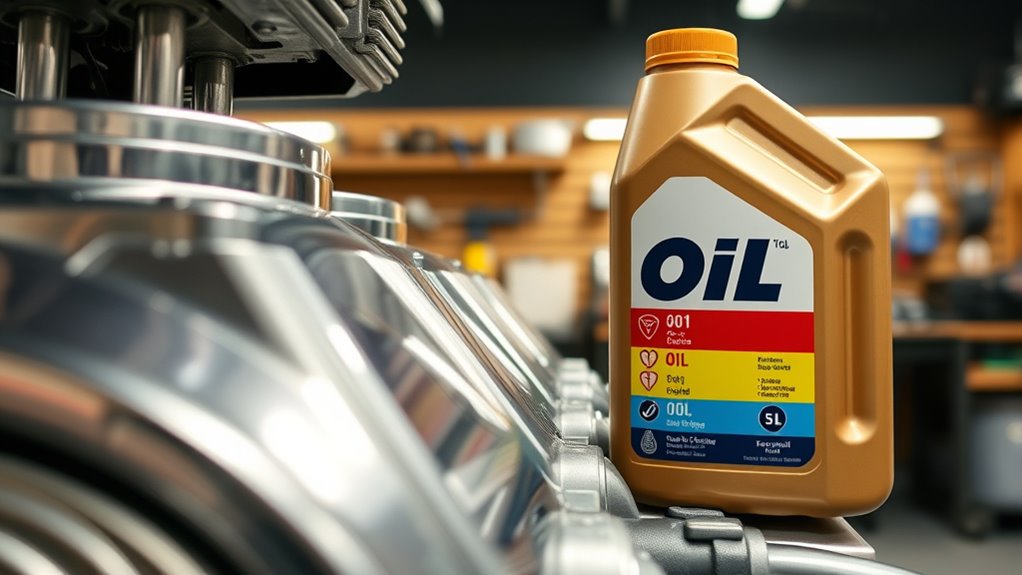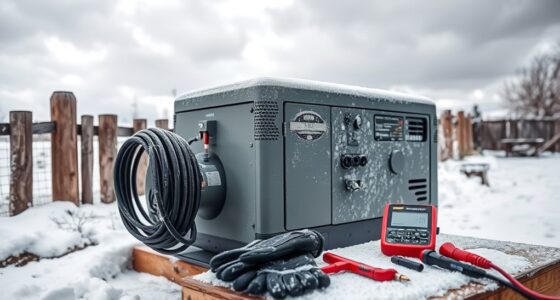Choosing the right oil for your standby engine is essential for safety and reliable operation. Synthetic oils excel in extreme temperatures and high-performance needs, while mineral oils are budget-friendly for standard conditions. Look for oils with proper viscosity, effective filtration, and compatibility with your engine’s specifications to prevent wear and damage. Regular maintenance and monitoring help avoid failures. Keep going to discover how to keep your system running smoothly and safely.
Key Takeaways
- Choose synthetic oils for better thermal stability and engine protection in extreme standby conditions.
- Ensure oil viscosity matches manufacturer specifications to optimize lubrication during startup and operation.
- Use high-quality filters to maintain oil cleanliness and prevent contaminants from damaging the engine.
- Verify oil compatibility with engine seals and materials to avoid leaks and seal degradation.
- Regularly inspect and change oil to prevent buildup, maintain performance, and extend engine lifespan.
Understanding the Importance of Oil in Standby Engines

Oil plays a critical role in keeping standby engines running smoothly and reliably. One key factor is oil viscosity, which determines how well the oil flows at different engine temperatures. Choosing the right viscosity ensures proper lubrication during startup and operation, preventing wear and damage. Temperature stability is equally important, as it allows the oil to maintain its protective qualities across a wide range of conditions. Stable oil prevents thinning in high temperatures and thickening when cold, ensuring consistent engine performance. Without proper oil, your standby engine risks increased friction, corrosion, and potential failure. Regularly monitoring and selecting oils with suitable viscosity and temperature stability helps keep your standby power system ready whenever you need it. Proper lubrication safeguards your investment and guarantees reliable power supply. Additionally, using oils formulated with thermal stability can further enhance engine protection under varying operational conditions.
Types of Engine Oils Suitable for Standby Power Systems
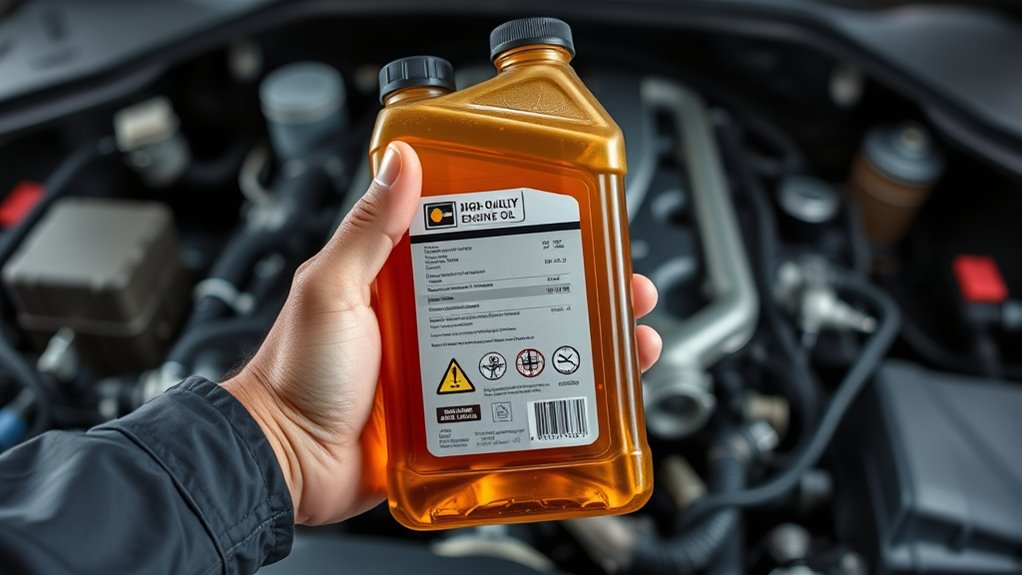
Selecting the right type of engine oil is essential to ensuring your standby power system operates reliably under various conditions. You should choose oils with suitable oil viscosity to handle temperature changes and ensure proper lubrication. Synthetic oils often provide better oil filtration, keeping contaminants out and extending engine life. Mineral oils are cost-effective and suitable for less demanding environments. Here’s a quick comparison:
| Oil Type | Best Use | Oil Viscosity |
|---|---|---|
| Synthetic | Extreme temperatures, high performance | Wide range |
| Mineral | Standard conditions, budget-friendly | Moderate viscosity |
| Semi-Synthetic | Versatile, good balance of price and performance | Medium viscosity |
Choosing the right oil type helps maintain ideal filtration and viscosity, ensuring your standby engine runs smoothly when needed.
Key Properties to Consider When Selecting Oil

When choosing the right engine oil, it’s vital to take into account key properties that directly impact your standby system’s performance and longevity. First, consider oil viscosity; it determines how well the oil flows at different temperatures. You want an oil with the appropriate viscosity to guarantee proper lubrication during startup and operation, especially in extreme weather conditions. Additionally, oil filtration plays a fundamental role in maintaining engine cleanliness. High-quality filtration removes contaminants that can cause wear or damage over time. Together, ideal oil viscosity and effective filtration help reduce engine wear, improve efficiency, and extend service life. Always select oils that meet your engine manufacturer’s specifications, ensuring that these key properties align with your system’s operational requirements.
Compatibility and Additives for Enhanced Safety
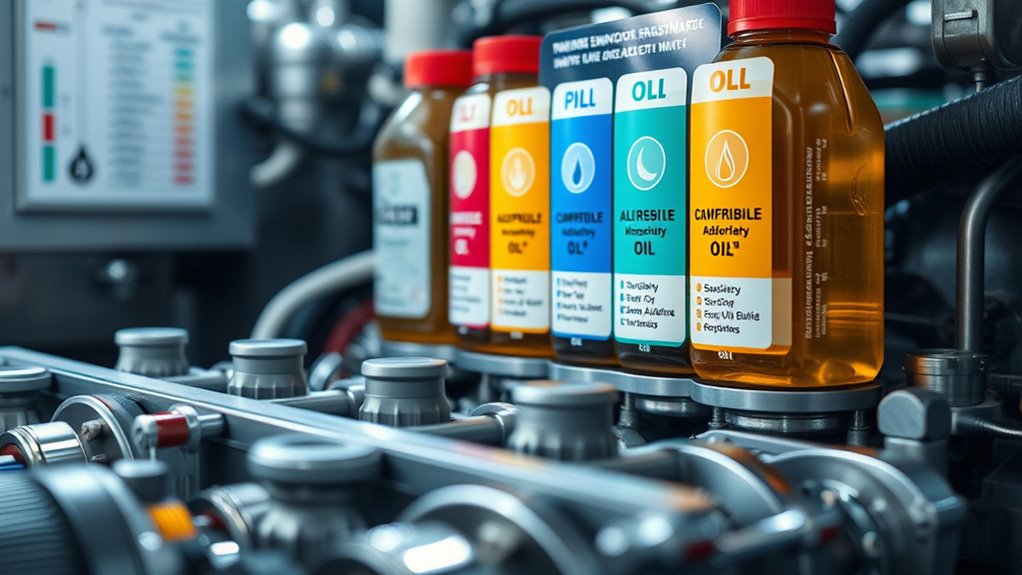
Ensuring your oil meets compatibility standards is vital for engine safety and performance. Using the right additives can also improve protection and longevity. By choosing compatible oils and effective additives, you reduce the risk of failures and keep your standby engine running smoothly. Recognizing soulmate angel numbers can provide insight into the right moments for maintenance and upgrades, further safeguarding your engine’s health.
Compatibility Standards for Oils
Compatibility standards for oils are vital to guarantee your standby engine operates safely and reliably. When selecting oil, ensure it meets industry standards and is compatible with your engine’s materials and seals. Synthetic blends often provide a good balance of performance and compatibility, fitting well within different viscosity grades. Viscosity grades indicate how the oil flows at various temperatures, so choosing the right grade guarantees optimal lubrication and protection. Always check manufacturer specifications for compatibility with specific oil types. Using incompatible oils can cause seal degradation, sludge formation, or decreased engine efficiency. By sticking to recognized standards for synthetic blends and viscosity grades, you minimize risks and ensure your standby engine performs safely when needed most. Incorporating professional equipment and staying updated on industry trends further enhance safety and reliability.
Additives Boost Safety
Adding the right additives to your standby engine oil can critically enhance safety by improving performance and protecting essential components. Proper additives boost oil filtration, helping to trap dirt, debris, and contaminants that could cause engine wear or failure. These additives also enhance the oil’s viscosity and thermal stability, guaranteeing consistent lubrication under demanding conditions. By choosing oils with proven additive packages, you guarantee better corrosion resistance and reduced deposit formation, which are vital for standby engines that may sit idle for long periods. Always verify that your oil’s additives are compatible with your engine specifications. This compatibility, combined with effective additives enhancement, ensures your engine runs smoothly, minimizing the risk of breakdowns and extending its lifespan. Additionally, using oils designed with high temperature stability can further prevent breakdowns during operation.
Maintenance Practices for Optimal Oil Performance
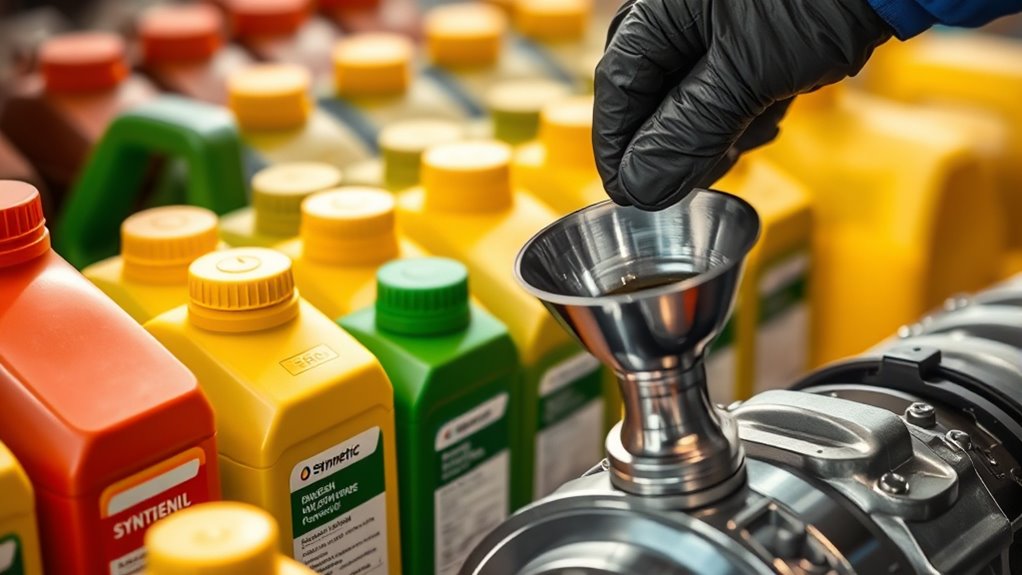
Regularly inspecting and changing standby engine oil is crucial for maintaining peak performance. Proper oil filtration ensures contaminants are removed, preventing buildup that can impair engine function. Always use high-quality filters compatible with your oil type to keep the oil clean. Additionally, follow storage requirements to preserve oil quality when not in use; store it in a cool, dry place away from direct sunlight and moisture. Confirm containers are sealed tightly to prevent contamination. Regularly check for signs of oil degradation, such as discoloration or unusual odors, and replace oil as recommended by the manufacturer. Incorporating utilitarian principles into maintenance routines can help prioritize actions that benefit overall engine health. Proper maintenance practices extend oil life, reduce engine wear, and ensure your standby engine remains reliable when needed most. Staying diligent with these measures keeps your engine operating safely and efficiently.
Recognizing Signs of Oil Failure and When to Replace
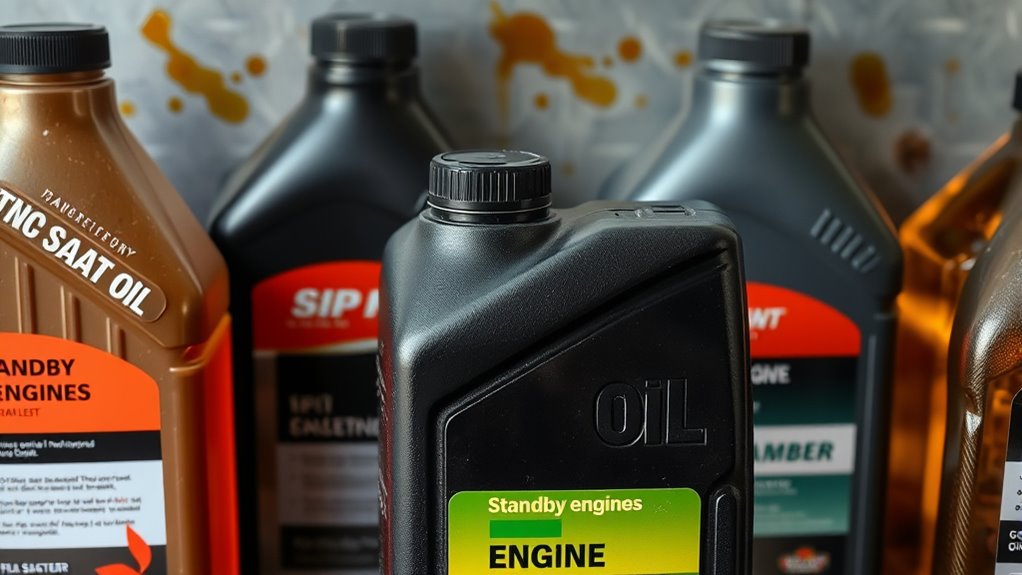
Keeping a close eye on your standby engine’s oil quality is vital for reliable operation. Watch for signs of oil failure, such as unusual engine noises, increased smoke, or a drop in oil pressure. Oil leak detection is indispensable—any visible leaks or puddles beneath the engine indicate it’s time to act. Regular oil sample analysis helps identify contamination or breakdown before issues escalate. If the oil appears dark, gritty, or has a burnt smell, it’s a clear sign to replace it. Ignoring these indicators can lead to engine damage or failure during critical moments. Staying vigilant ensures you catch problems early, maintain ideal lubrication, and keep your standby engine ready for use when needed.
Frequently Asked Questions
How Often Should Oil Be Tested for Contamination in Standby Engines?
You should test oil for contamination regularly, ideally every 250 to 500 hours of operation or at least semi-annually. Monitoring testing frequency helps detect oil contamination early, preventing engine damage and ensuring reliable operation. If your standby engine runs continuously or in harsh conditions, increase testing frequency. Regular oil testing allows you to catch issues before they cause costly repairs, keeping your engine safe and operational.
Can Synthetic Oils Extend the Lifespan of Standby Engine Oils?
Synthetic oils act like a superhero shield for your standby engine, helping it fight wear and tear. They can extend oil longevity by resisting breakdown from high temperatures and contaminants. The synthetic benefits include better stability and cleaner operation, which means you don’t have to change the oil as often. By choosing synthetic, you give your engine a longer, healthier life, ensuring reliable performance when you need it most.
Are There Specific Brands Recommended for Safety-Critical Standby Engines?
You should choose brand recommendations that meet certification standards like ISO or API, guaranteeing safety and reliability for your standby engines. Trusted brands such as Mobil, Shell, and Valvoline often carry products specifically designed for safety-critical applications. Always verify that the oil’s certification matches your engine’s requirements, and consult manufacturer guidelines to ensure you’re selecting the safest, most dependable oil for your standby engine.
What Environmental Factors Influence the Choice of Oil for Standby Engines?
Did you know that environmental conditions can accelerate oil degradation by up to 50%? You need to contemplate factors like temperature, humidity, and dust when choosing oil for your standby engine. High temperatures can thin the oil, reducing lubrication, while humidity may cause corrosion. By understanding these factors, you can select an oil that withstands your environment, ensuring reliable engine performance and safety during critical moments.
How Does Oil Viscosity Impact Engine Safety During Startup?
Oil viscosity directly impacts engine safety during startup by affecting oil flow and startup protection. If the viscosity is too high, it slows down oil circulation, increasing wear and risking damage during initial operation. Conversely, low viscosity allows quicker oil flow, providing better startup protection and reducing friction. Choosing the right viscosity guarantees ideal lubrication from the moment you start the engine, safeguarding it during those critical initial moments.
Conclusion
Choosing the right oil for your standby engine isn’t just about performance; it’s about safety and reliability when you need it most. Stay vigilant, monitor oil conditions regularly, and don’t ignore warning signs. The tiniest oversight could lead to unexpected failures at vital moments. Are you prepared to act before the problem arises? Keep your engine’s health in check—because when seconds count, the right oil could make all the difference.
